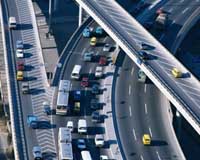
Traffic in Beijing is expected to improve so much that by 2008, the year this city hosts the summer Olympic Games, it will take less than half an hour for athletes to travel from the Olympic Village to every venue in the city.
Traffic in Beijing will not be a headache at all but rather will become an enjoyable experience by 2008, vowed Liu Xiaoming, deputy director of the Beijing Municipal Communications Commission, in an interview with China Daily.
That goal will be reached without initiating any major ban on motor vehicles nor control over vehicle numbers over the next five years, Liu said.
"I am very confident that Beijing will fulfill its commitments to the world concerning transportation in 2008,'' said Liu, who is also a respected expert on urban communications research.
Effective traffic regulation methods that have been successful in other countries will be adopted. As well, a special plan is being designed to ensure that traffic speed for motor vehicles in peak traffic periods by 2008 will be ensured to maintain at least 20-30 miles per hour.
It is estimated that the number of motor vehicles in Beijing will increase to over 3.5 million by 2008 from the present 2 million, while the structure of the road grids will be in need of significant improvement.
It is also a widespread worry that traffic in Beijing would continue to be a headache for all people concerned, from Olympic organizers and government officials to drivers, pedestrians and cyclists.
The number of motor vehicles climbed to 2 million in August, with Beijing residents experiencing more serious traffic jams than before in the latter half of the year, especially during rush hours and on rainy days.
"Congestion, which can not be avoided in the development of a metropolis, will be temporary for Beijing,'' said Liu, noting that the Chinese capital has stepped into an era of traffic congestion.
Liu's confidence in the improvement comes from the heavy investment and scientific layout of Beijing's transportation system to be carried out over the coming years.
The city will invest 35 billion yuan (US$4.2 billion) in infrastructural facilities for transportation in 2004, a 68 percent jump in this area from last year, Liu's commission announced.
Priority will be given to traffic facilities in seven areas, including where the Olympic Green and previous Asian Games Village are located in the northern part of Beijing.
"When the National Stadium and the National Swimming Center’s construction began in late December, the area around the site of the previous Asian Games Village is facing more serious traffic conditions,'' Liu explained.
The area, a residential neighborhood with sporting facilities in place, was listed as one of the city's 84 most congested areas, according to an announcement by the Beijing Public Security Bureau of Traffic Administration.
The official said his commission, established in February for the comprehensive management of communications while replacing the communications bureau previously in place, would make efforts this year on communications management in areas where construction of Olympic venues will be taking place.
Besides the four venues that broke earth last month, Olympic venue construction will reach a peak this year with the opening construction of five gymnasiums including the Olympic Village and the Wukesong Cultural and Sports Center, which will no doubt put pressure on the city's transportation system.
"The negative influence will be reduced to a minimum,'' Liu vowed.
In order to update Beijing's communications system and relieve congestion, the public transportation system and urban railways in particular will be given priority for construction this year.
Public transportation only shoulders 24 percent of the city's transportation needs, less than the 31 percent accounted for by private cars and taxicabs, according to Liu. He said the percentage of public transportation would reach 60 percent by 2008.
A total of five urban railway lines are expected to begin construction this year, including the light rail from Dongzhimen to Beijing's Capital International Airport.
The length of Beijing's urban railways has mounted to 114 kilometers with the city's fourth railway line the Batong Line opening to traffic last month.
(China Daily January 5, 2004)
|

